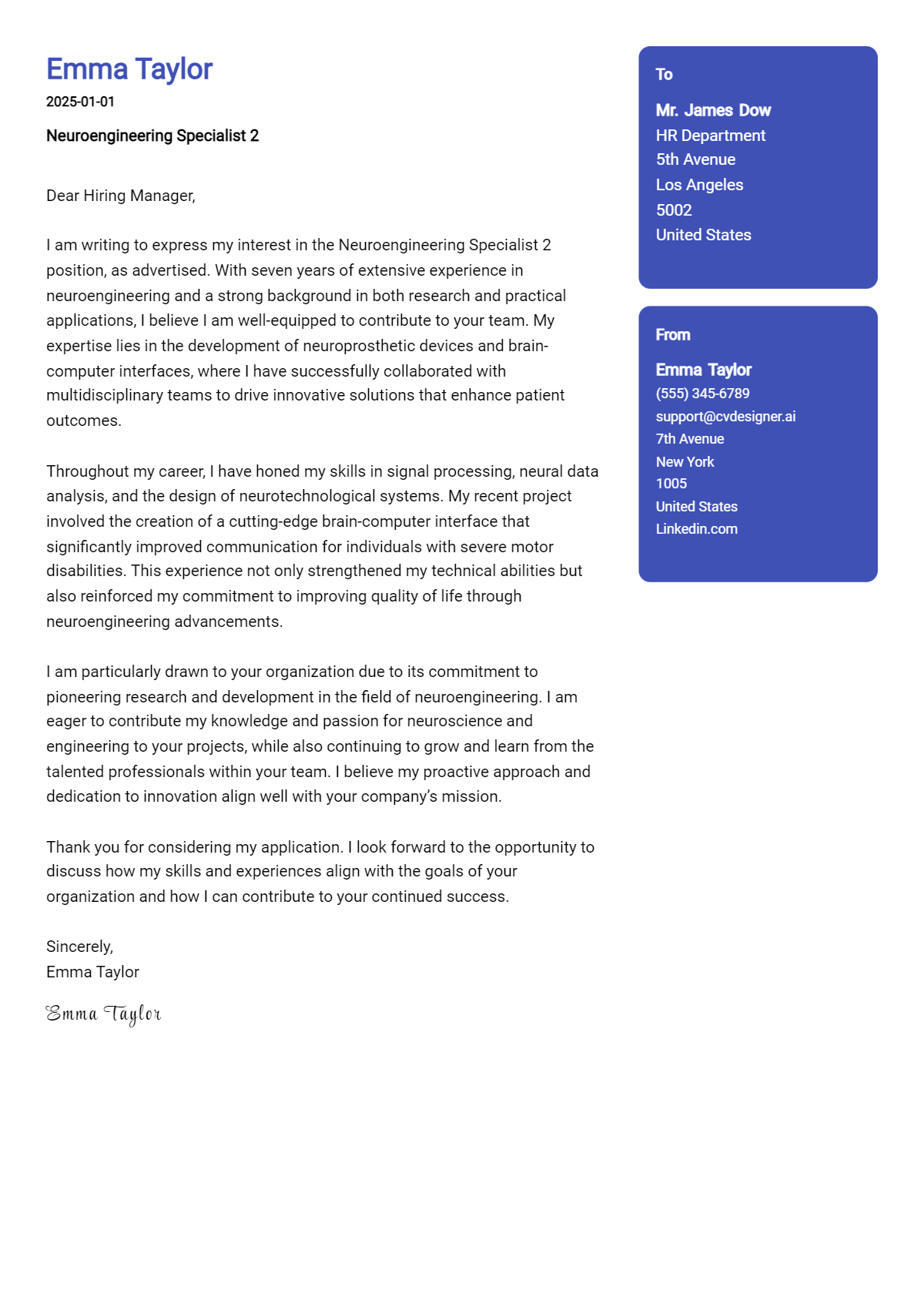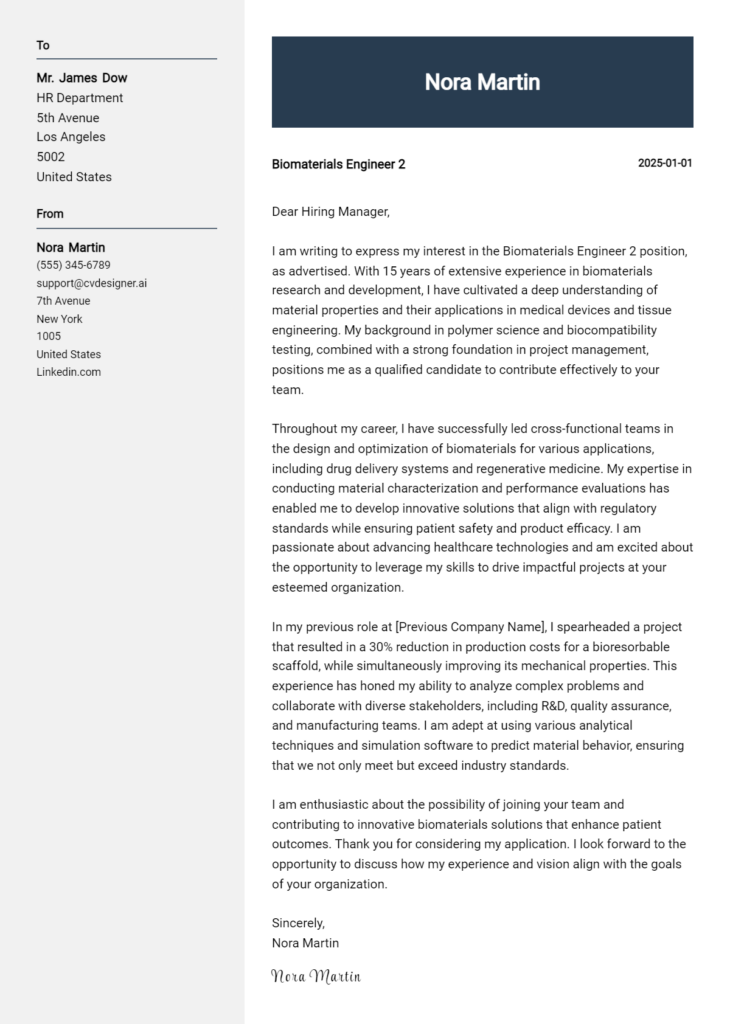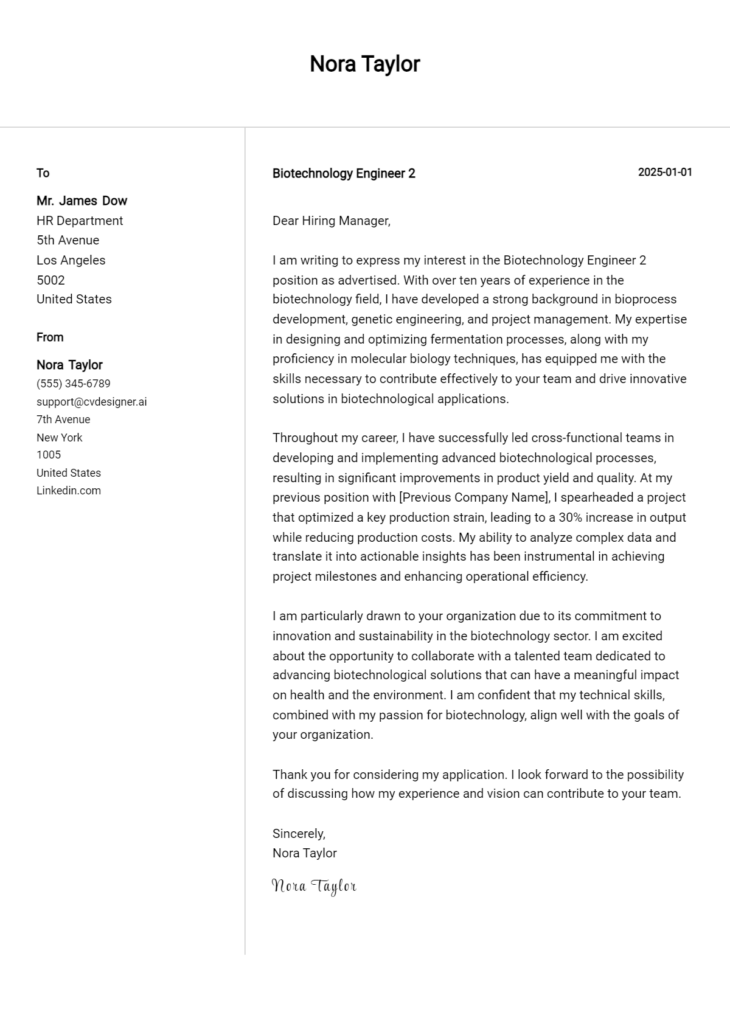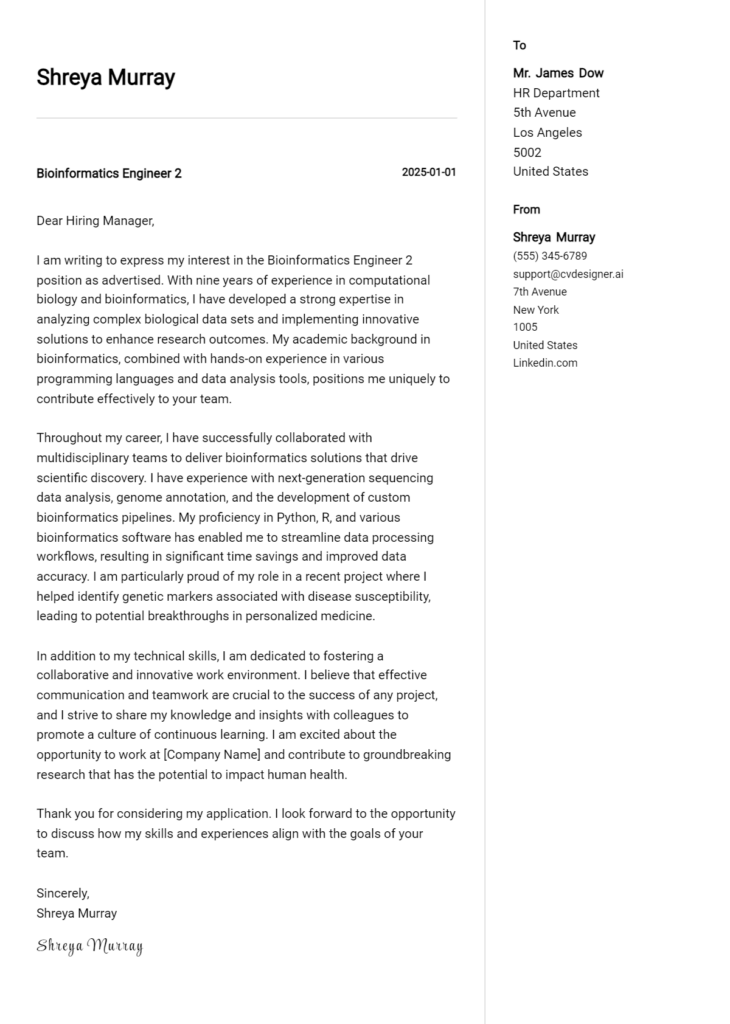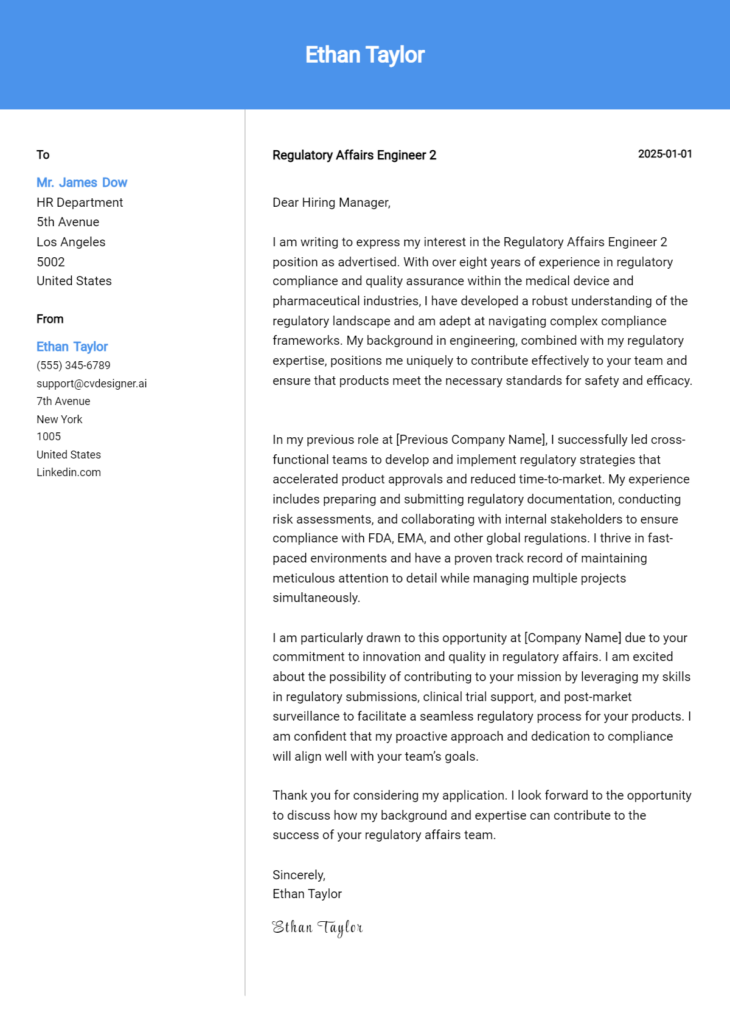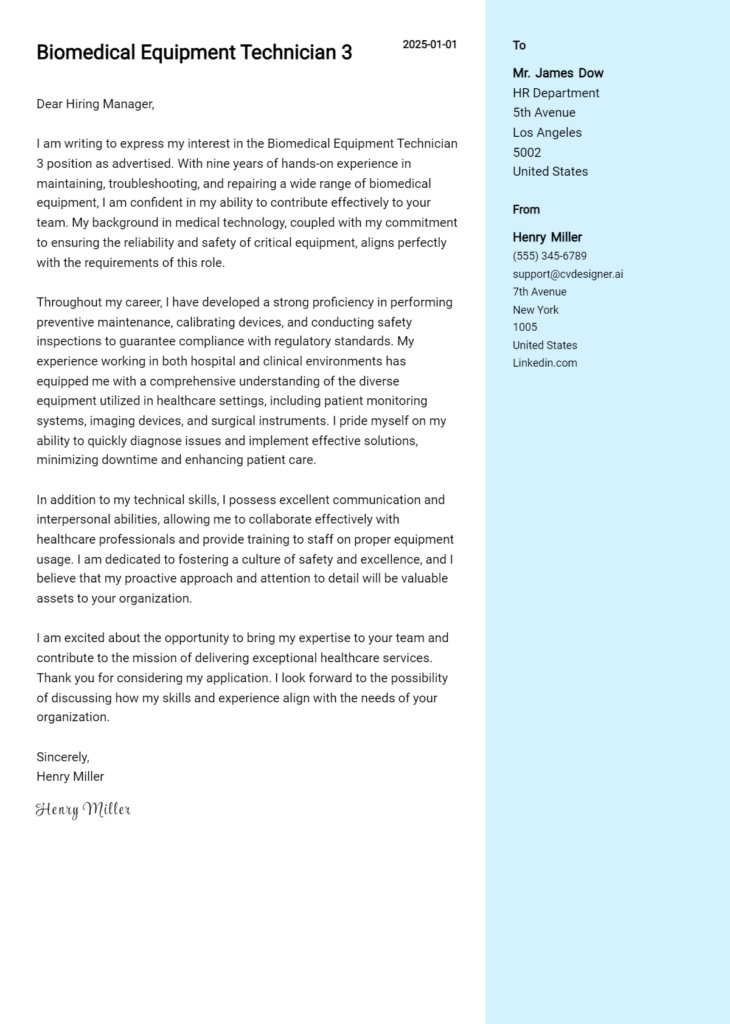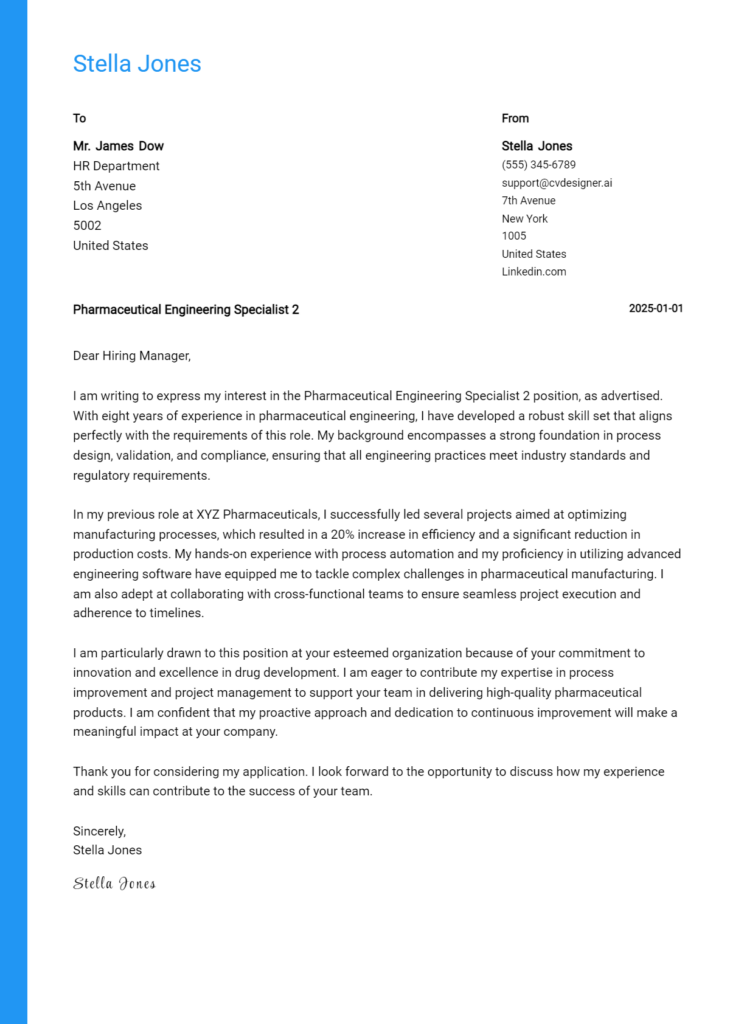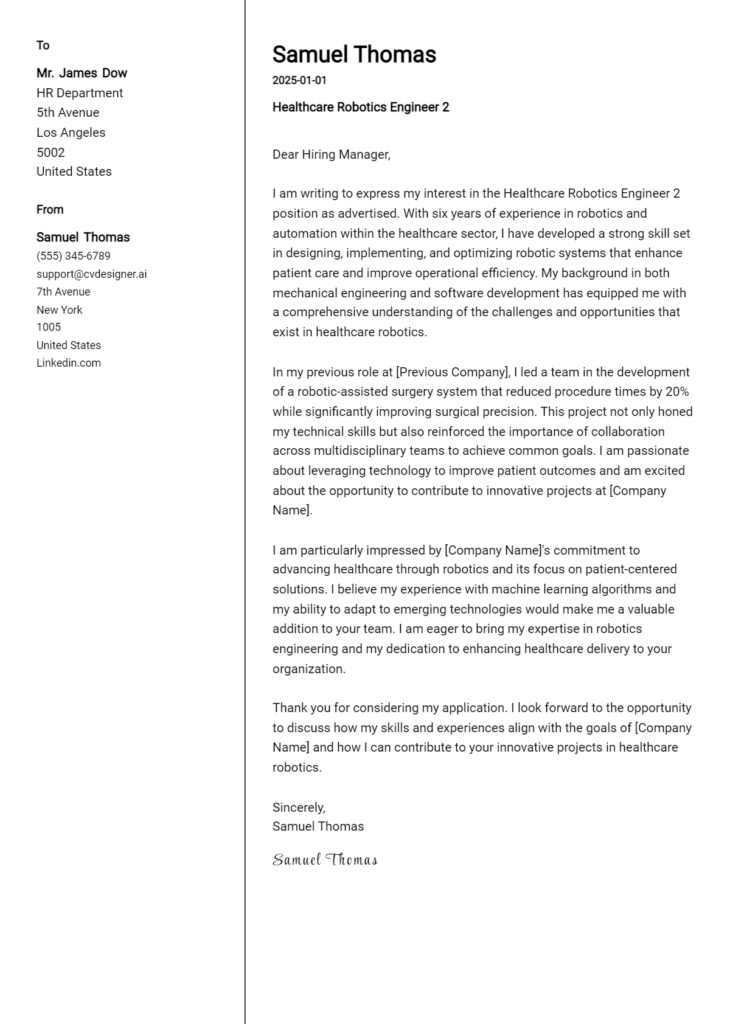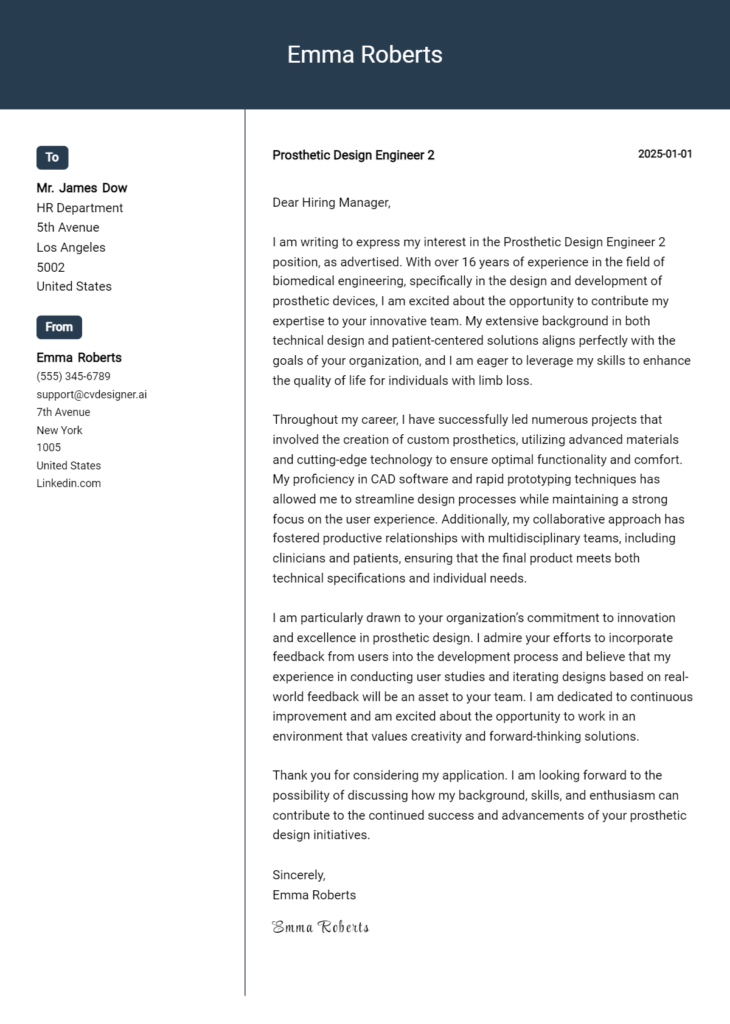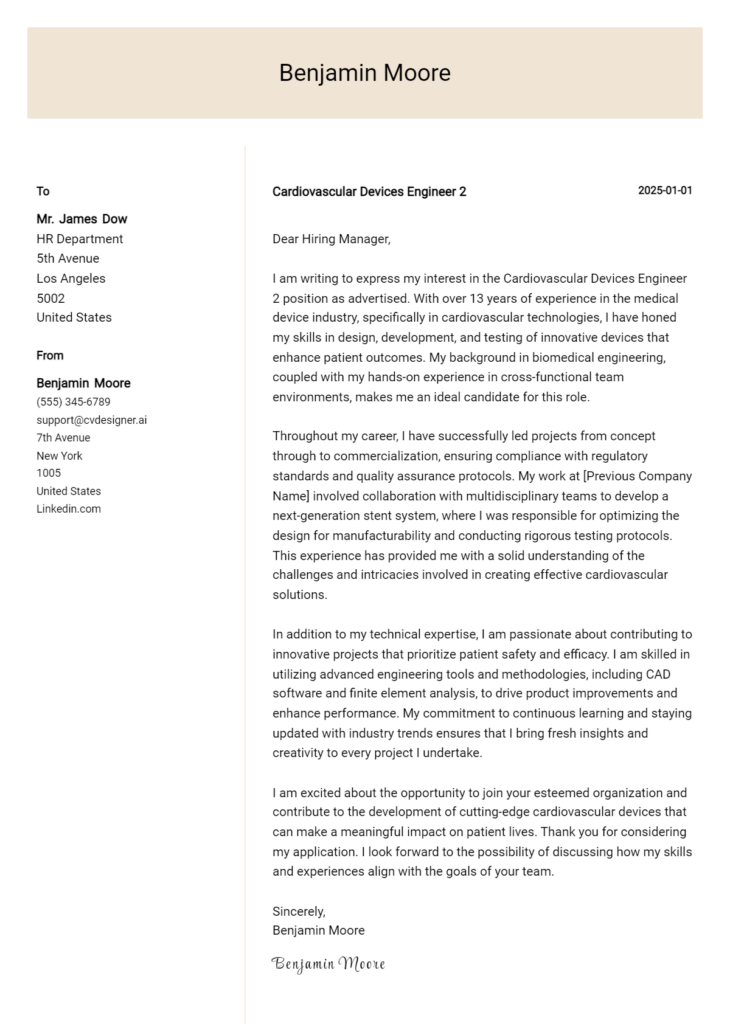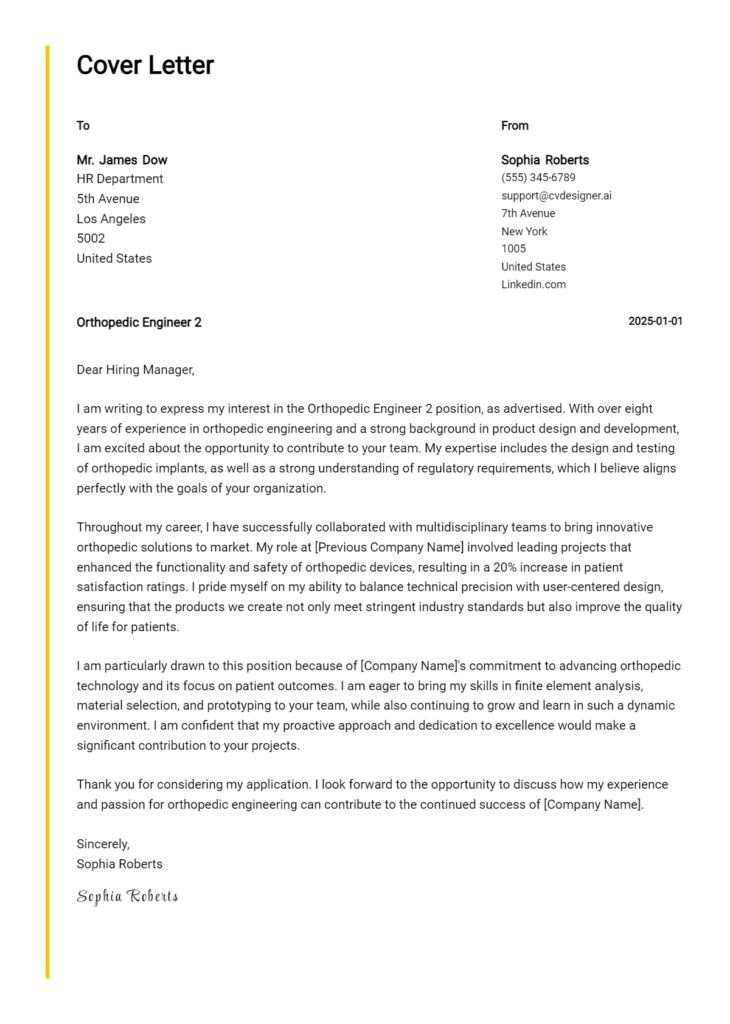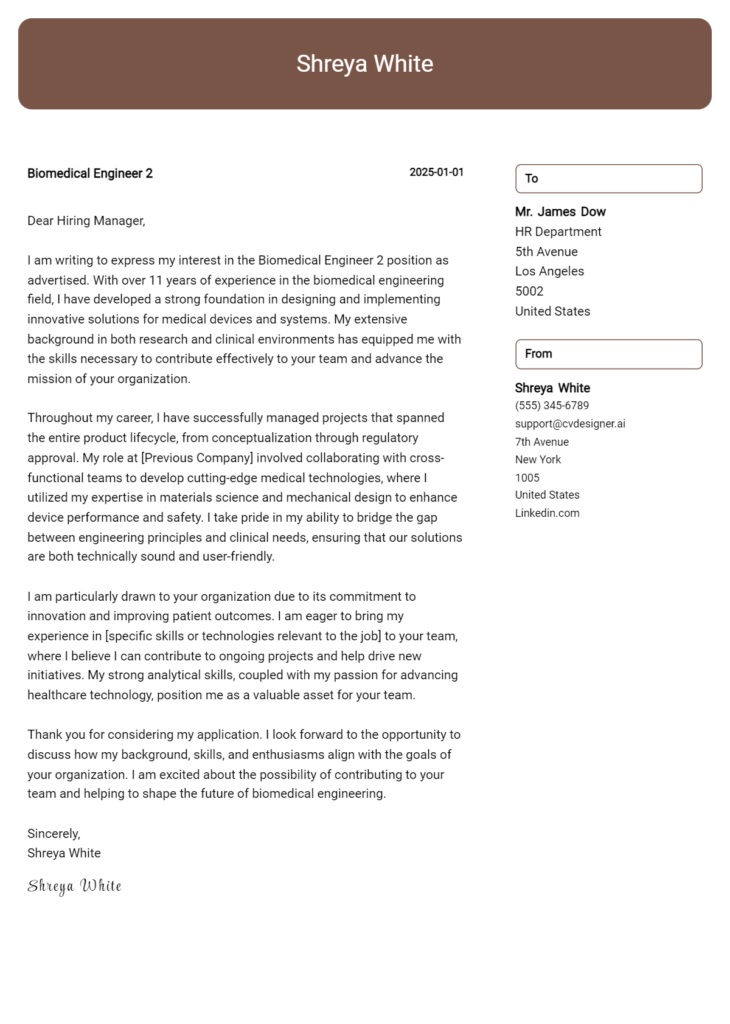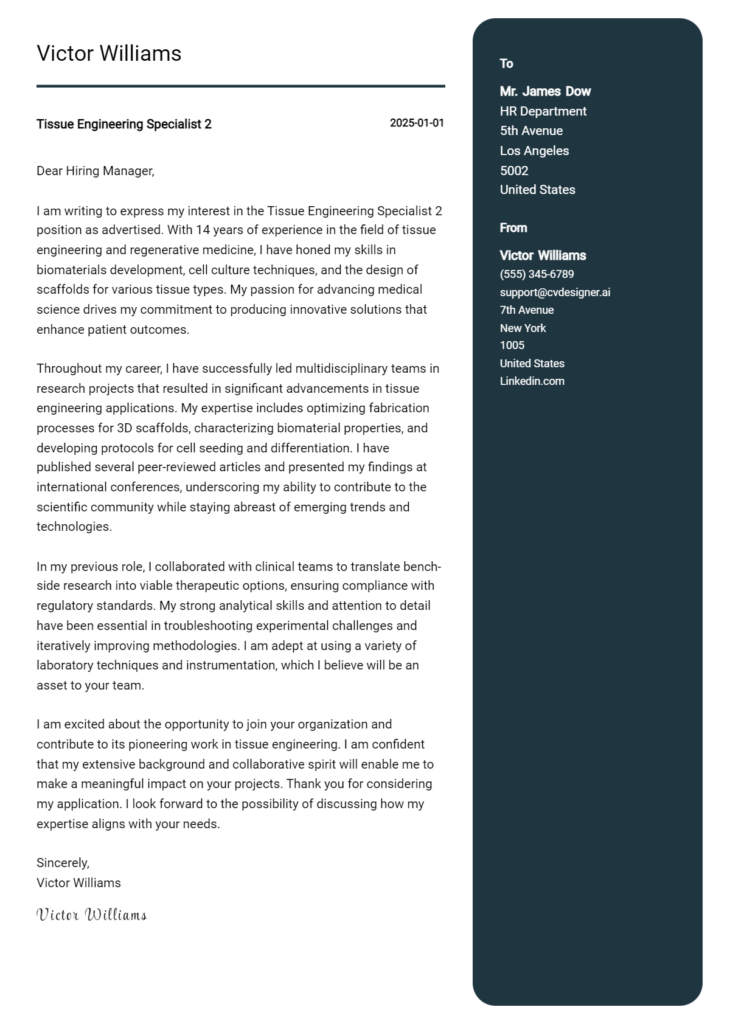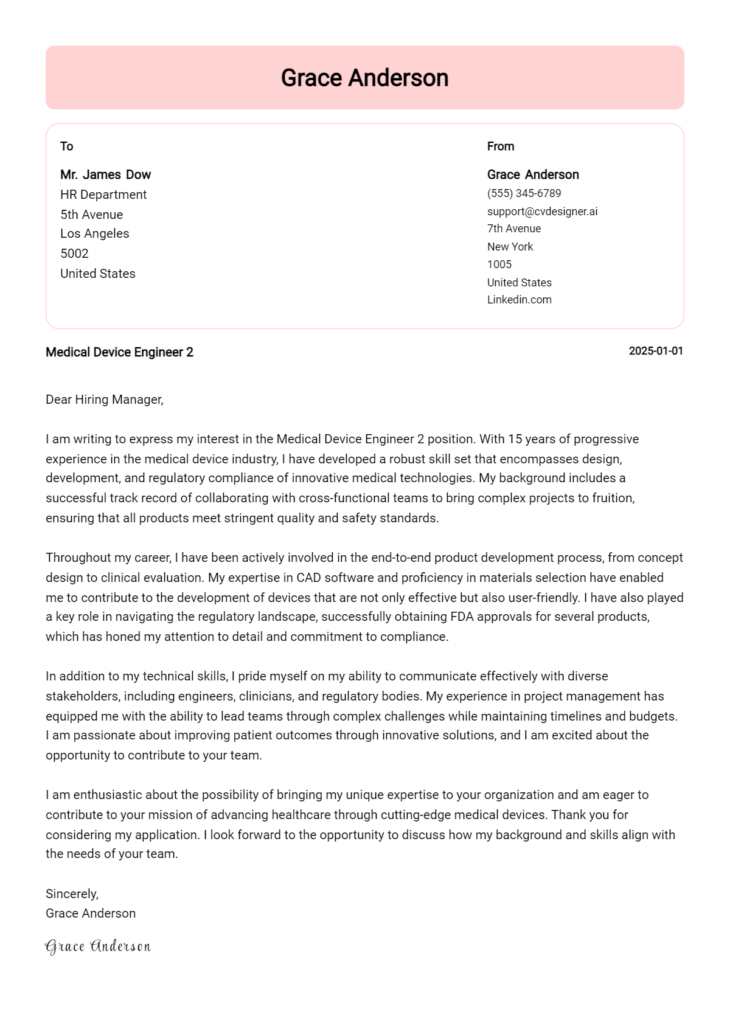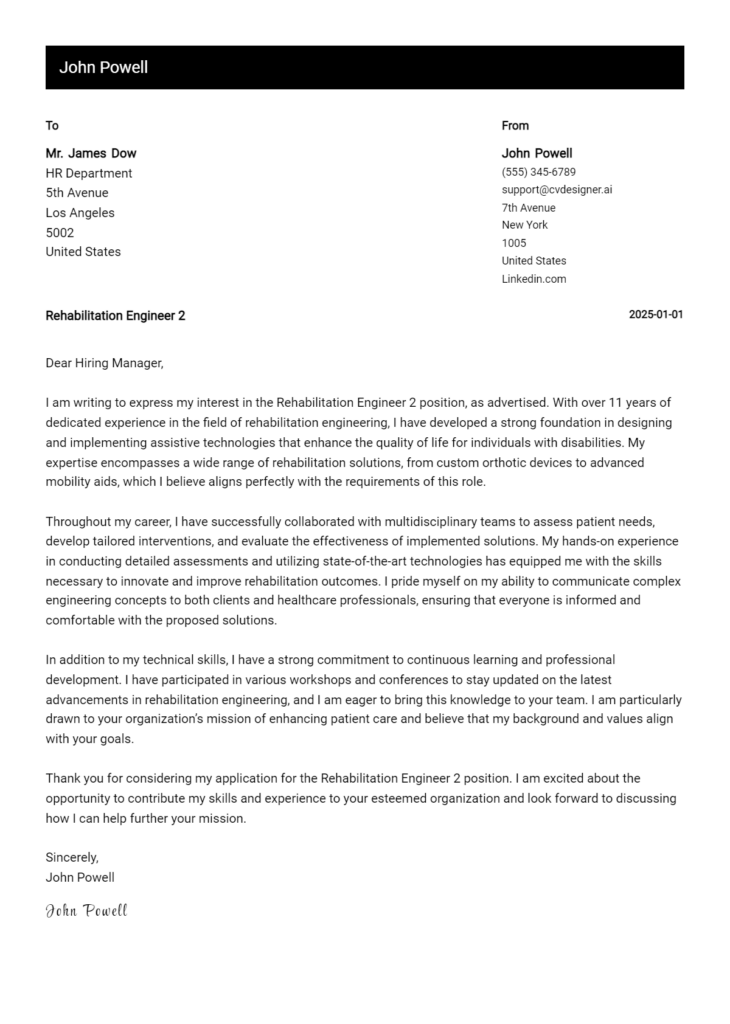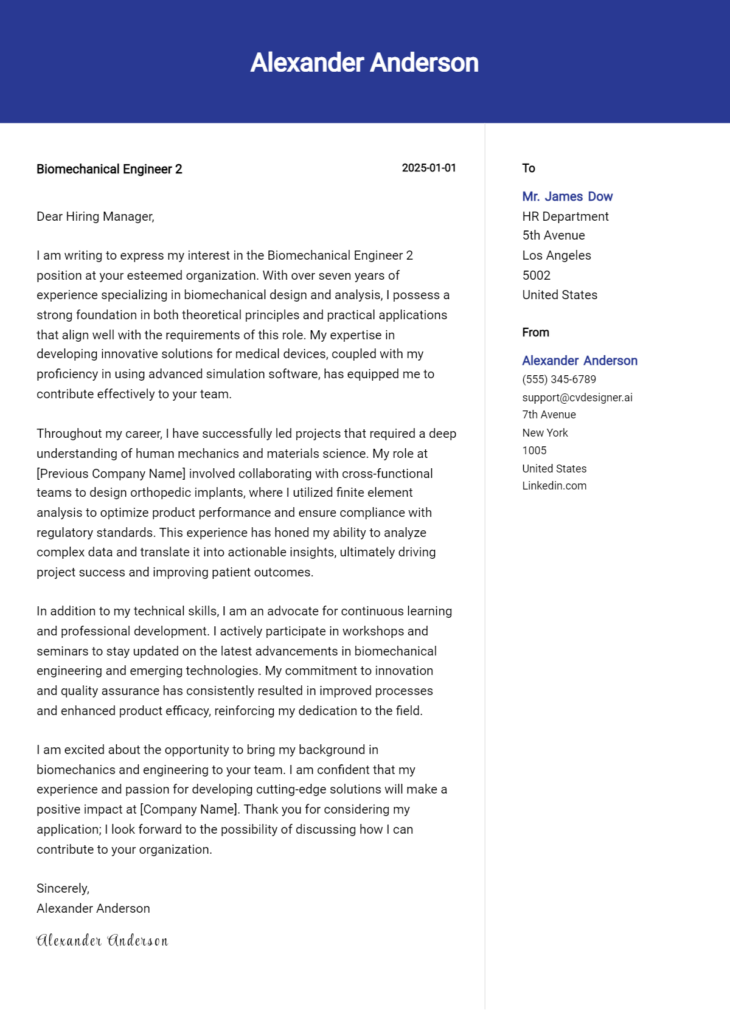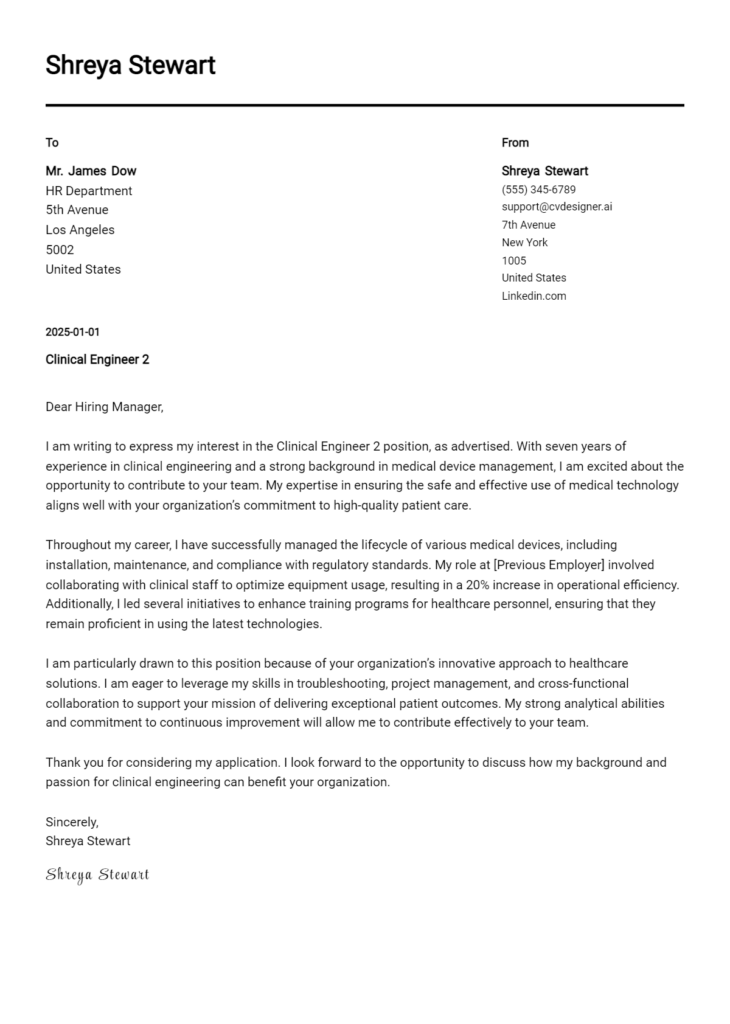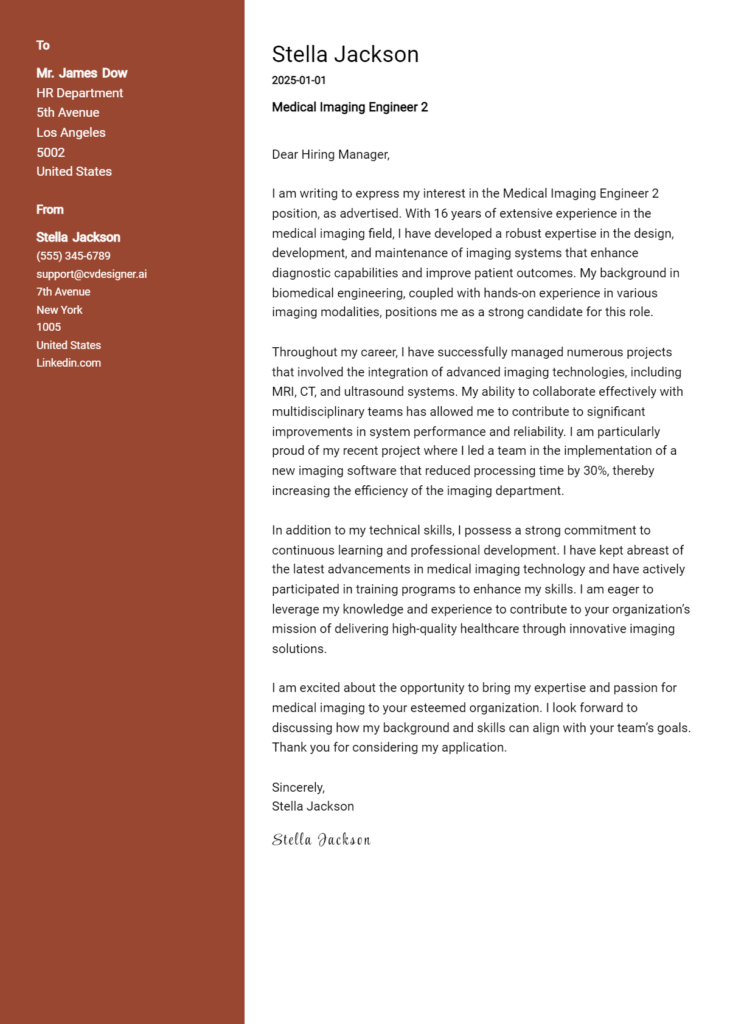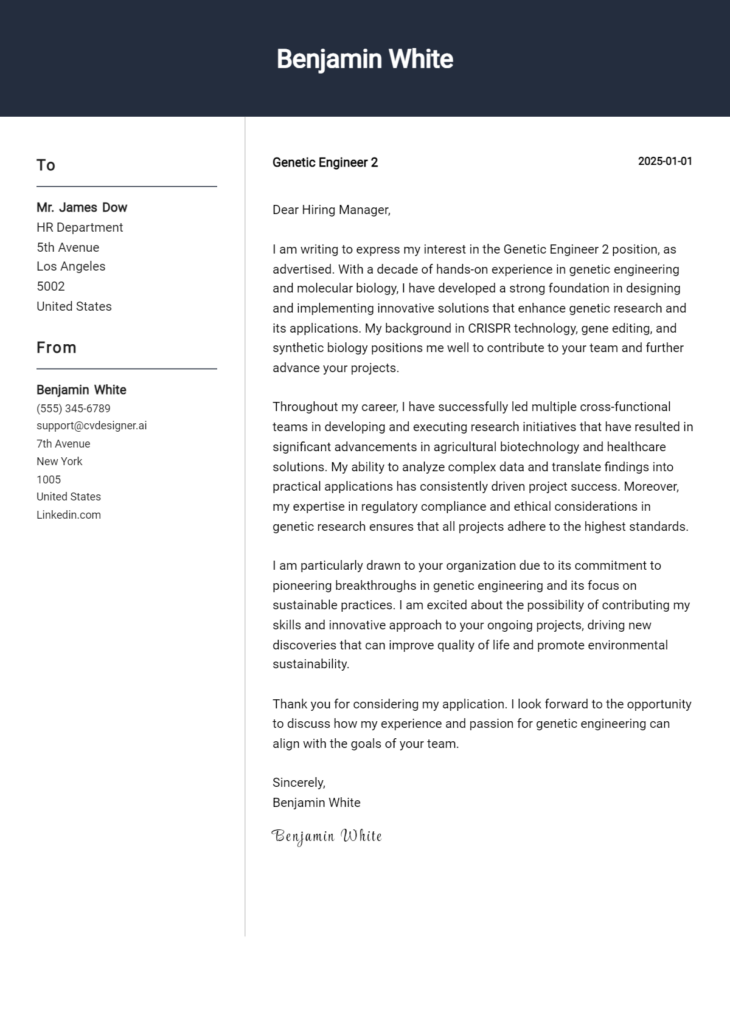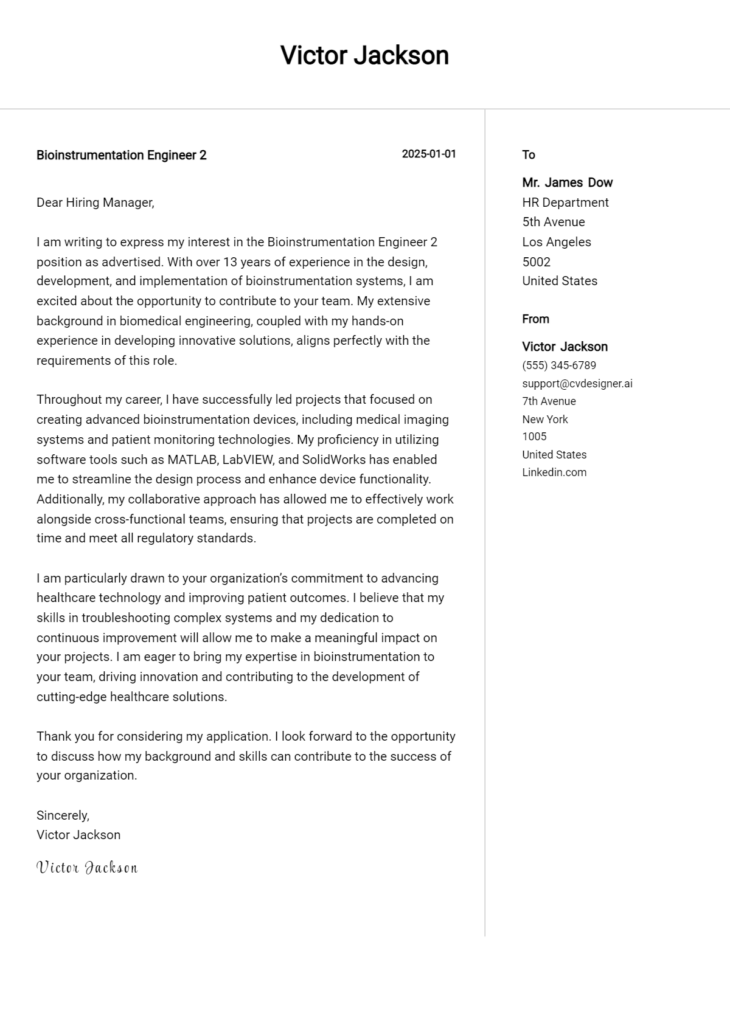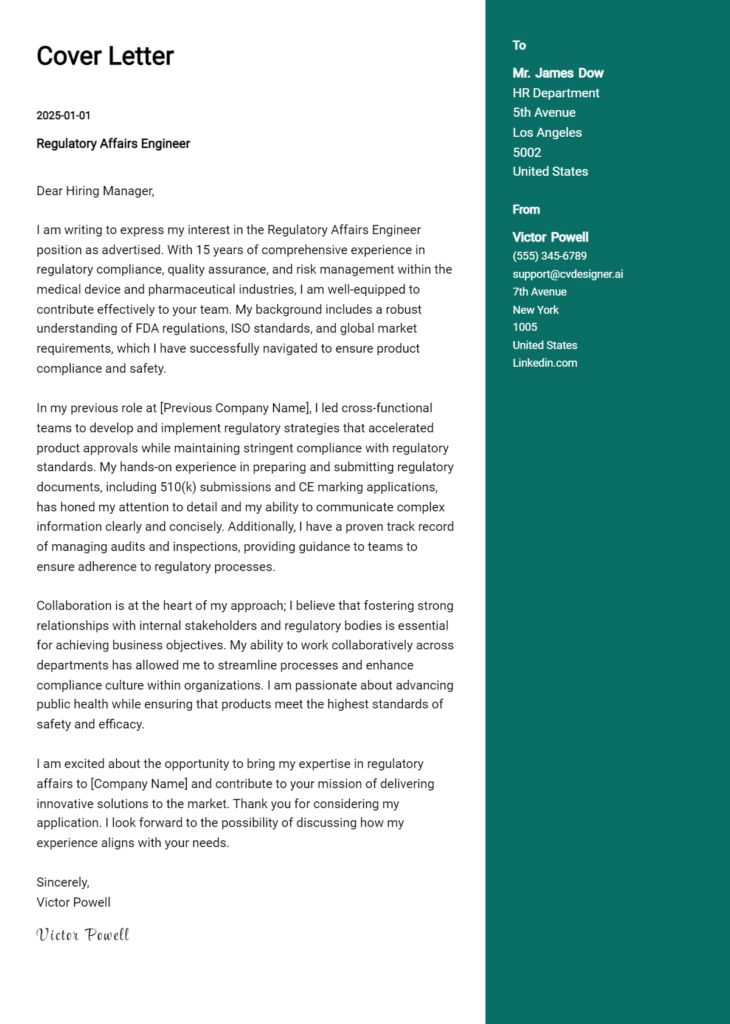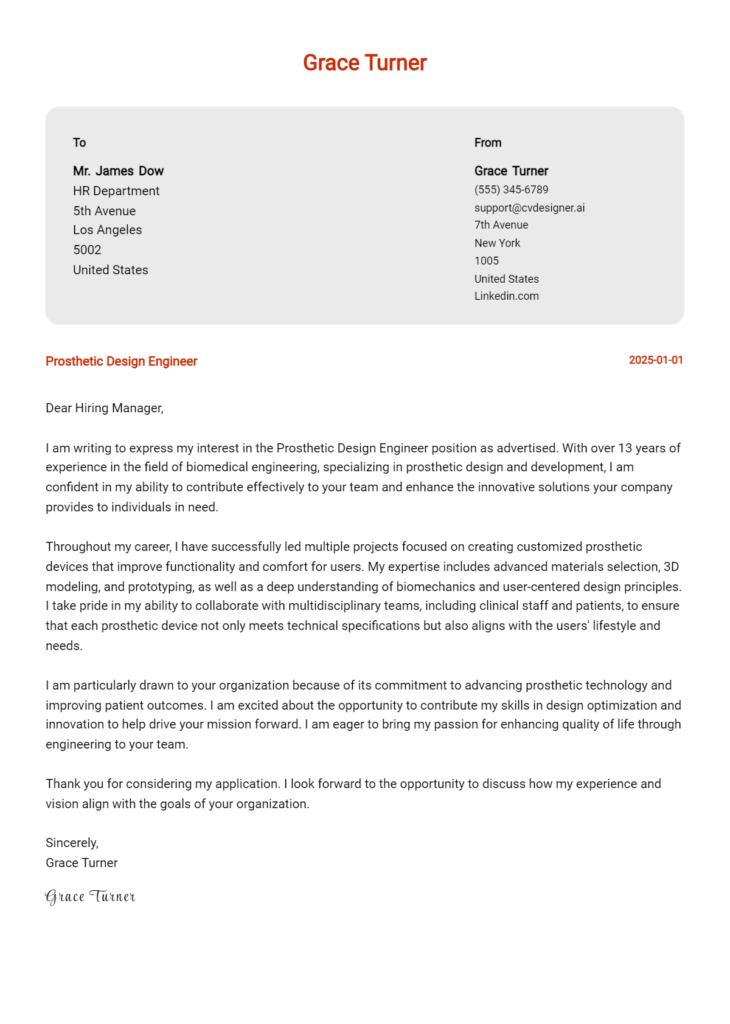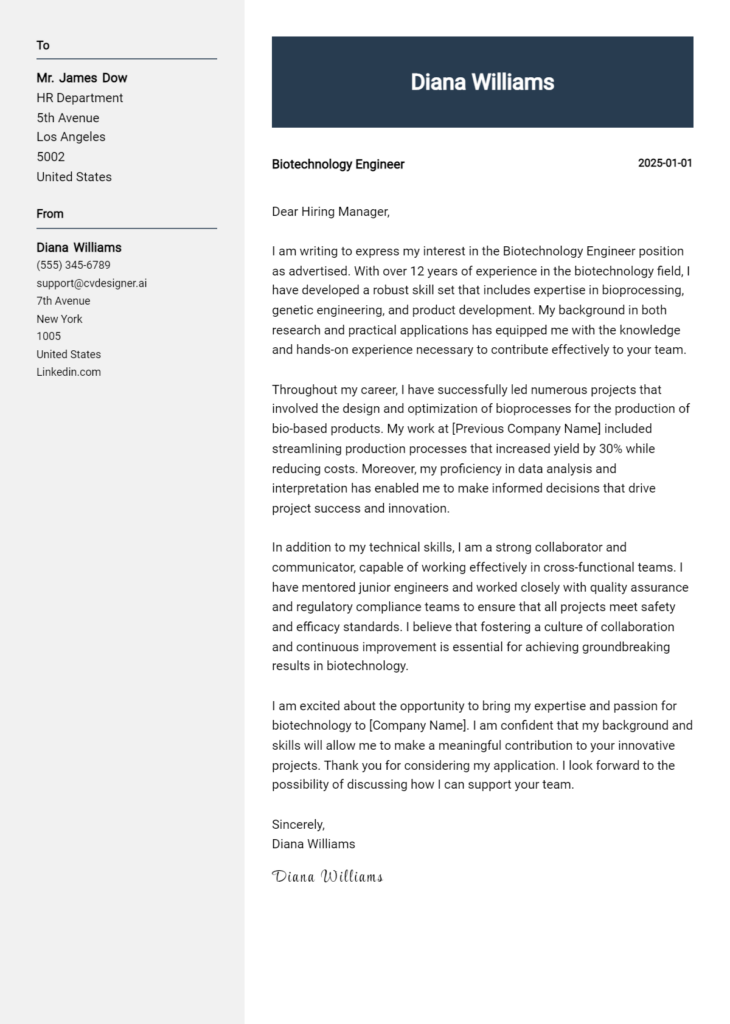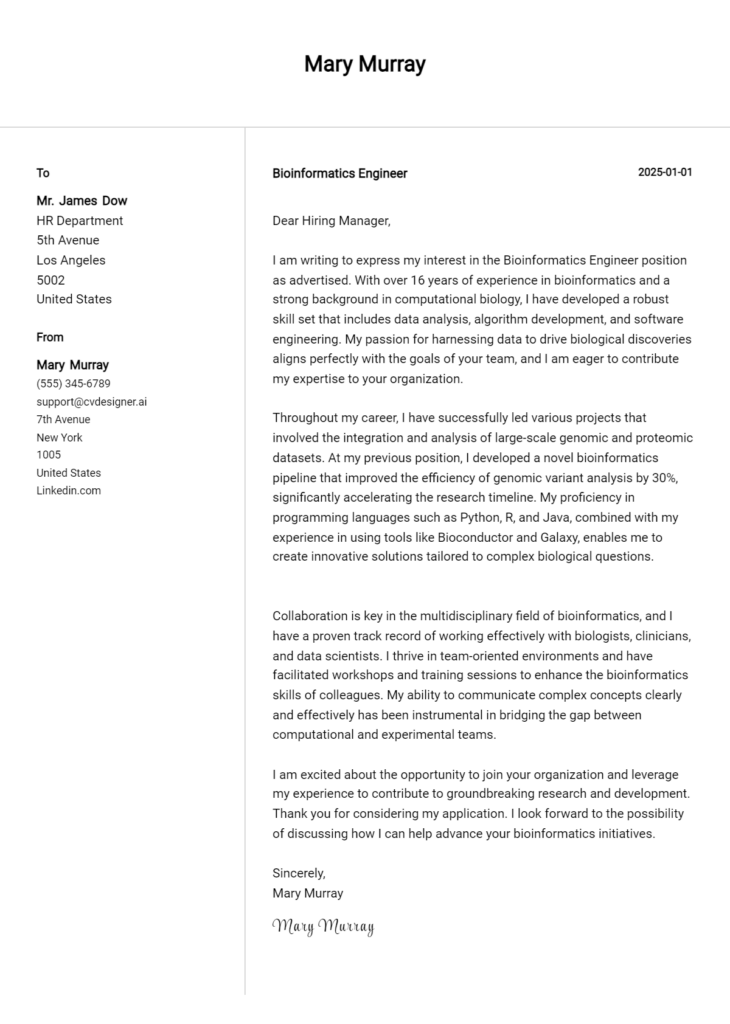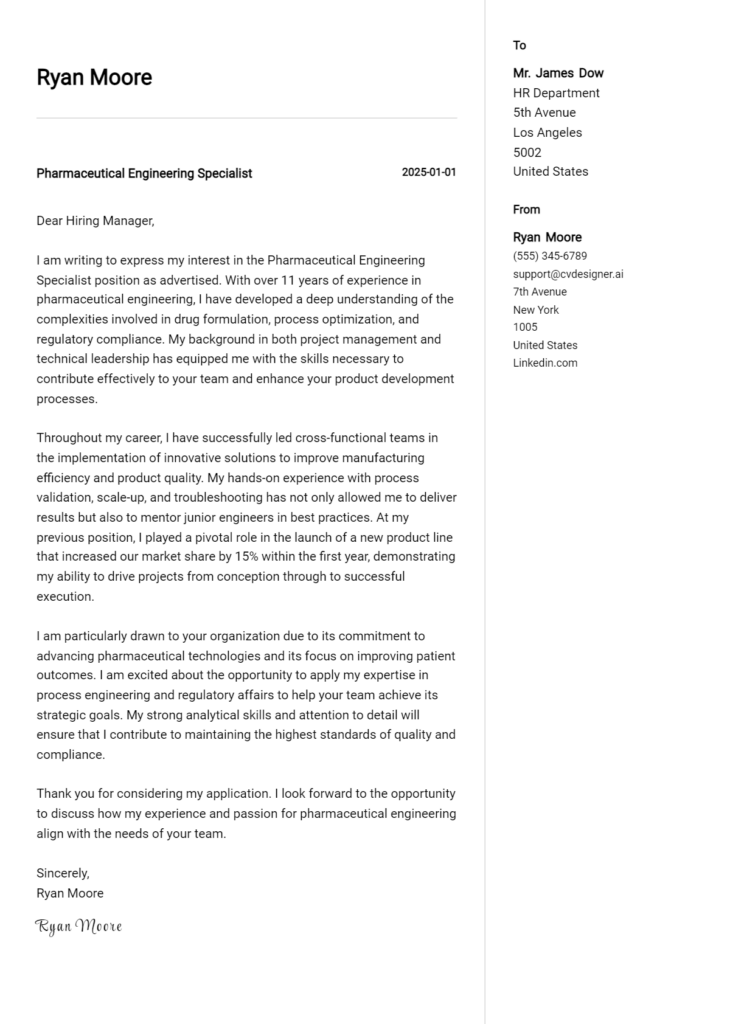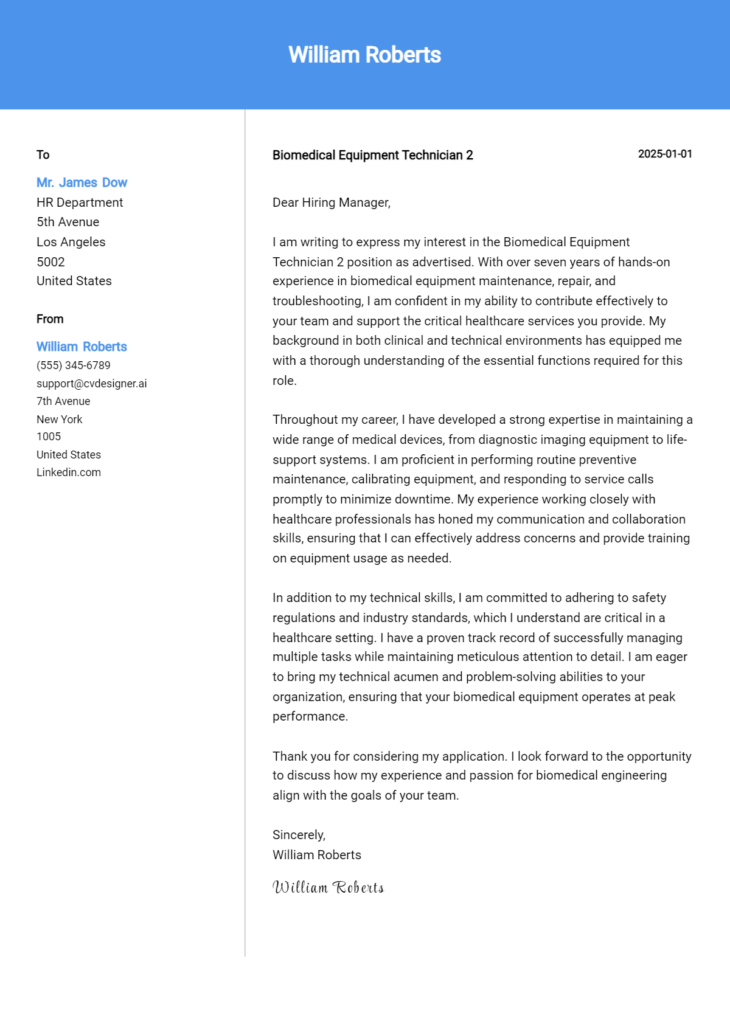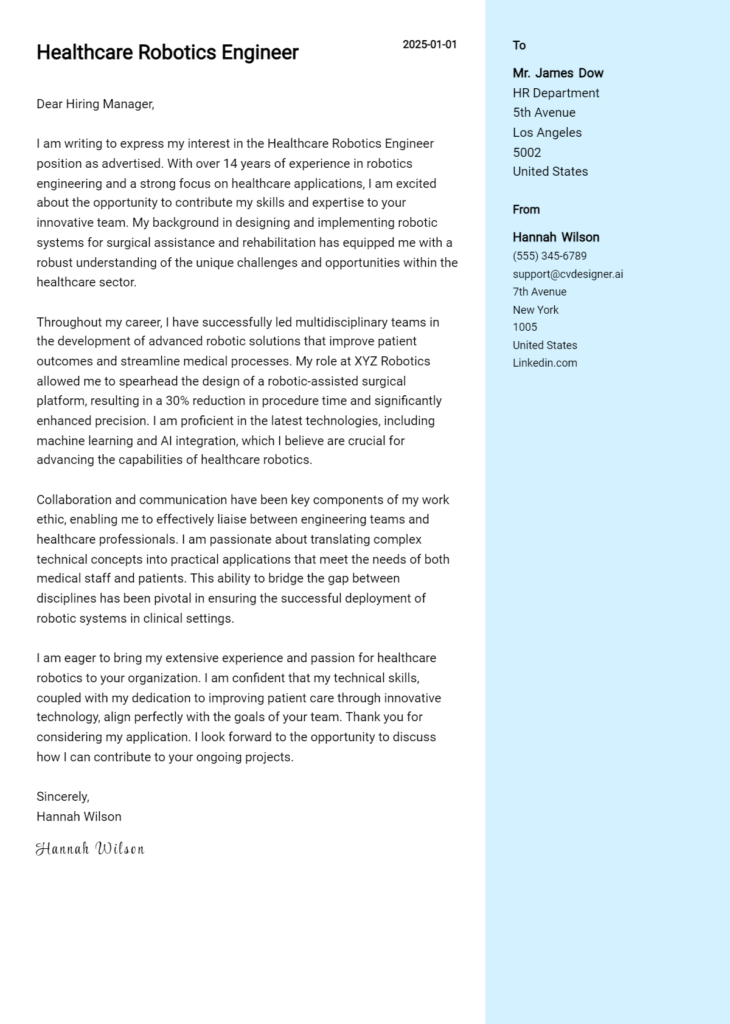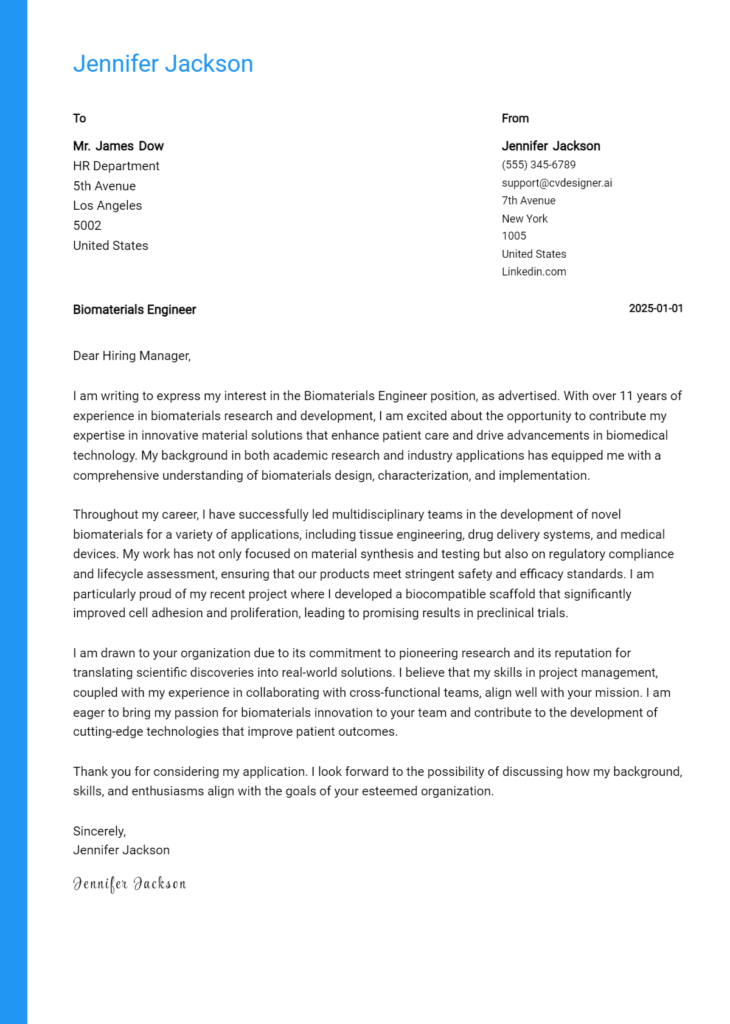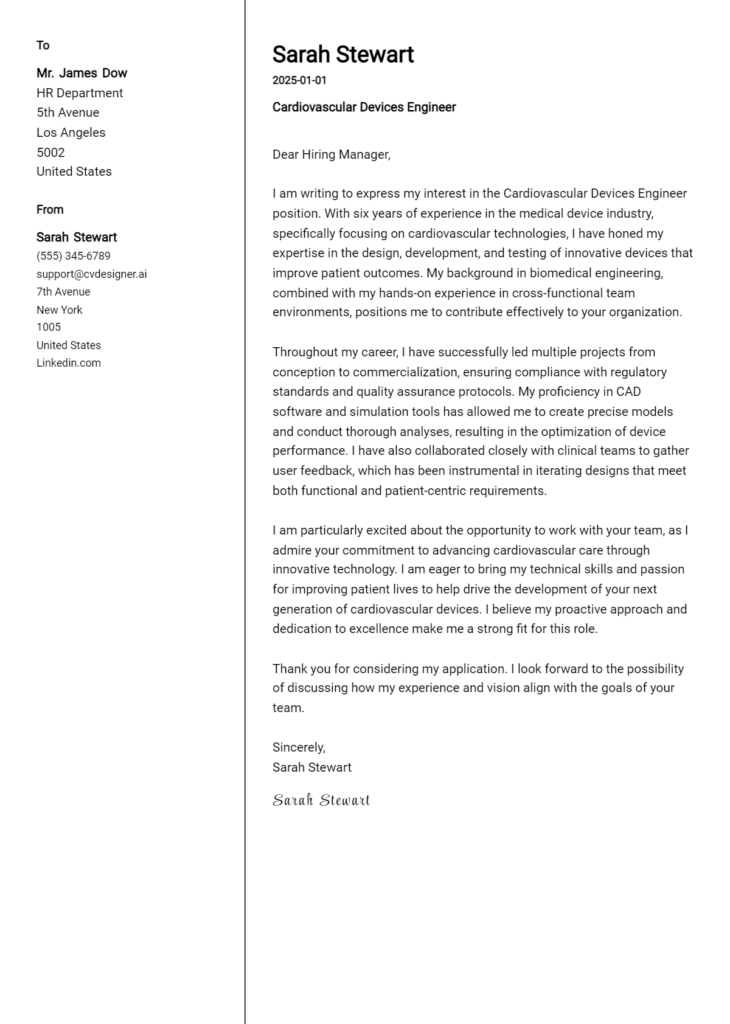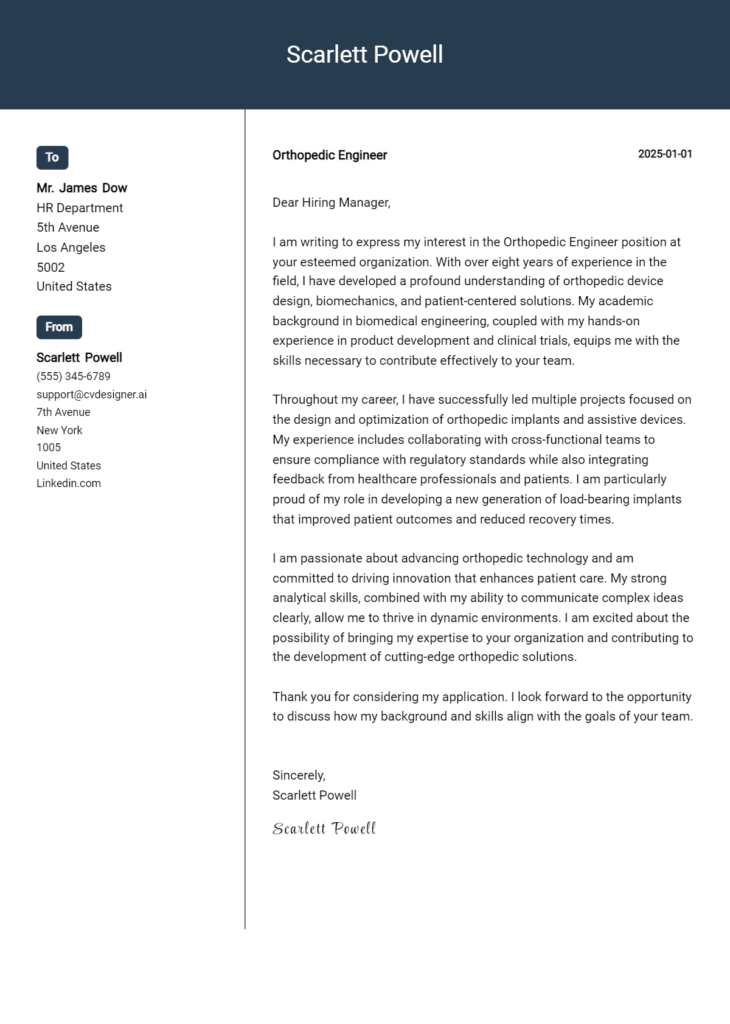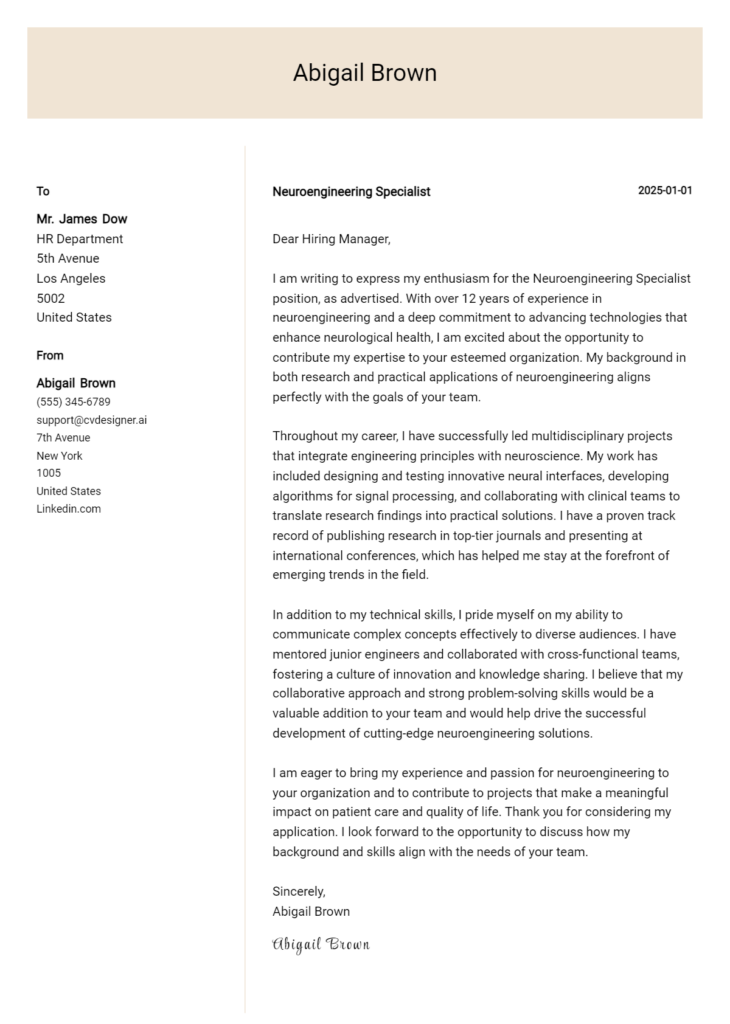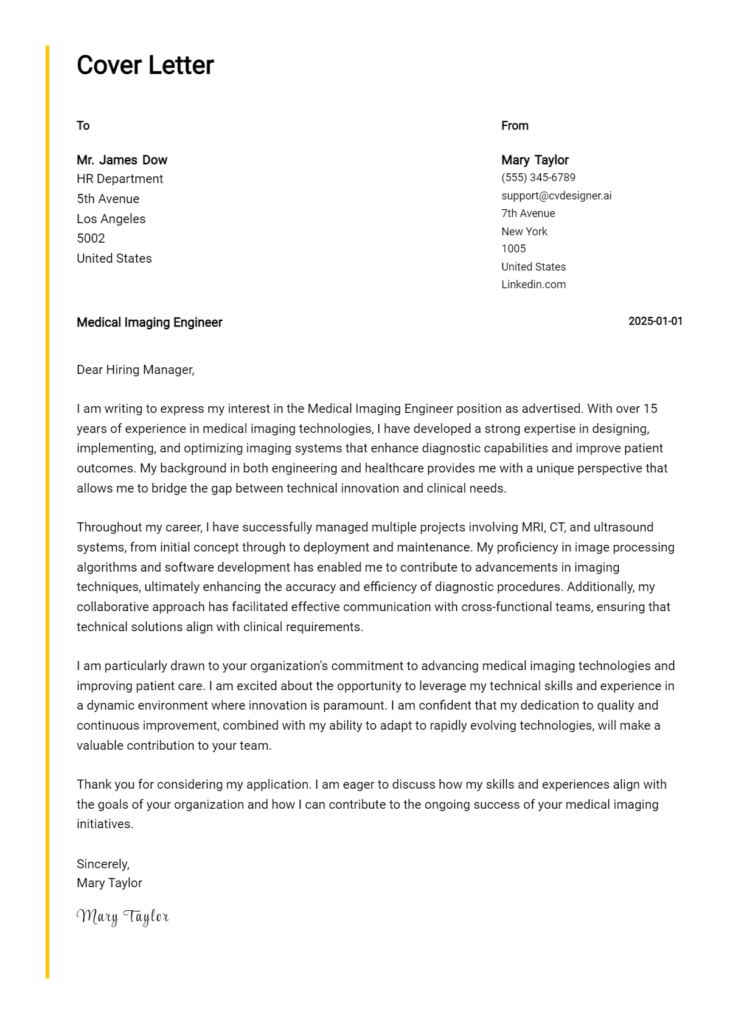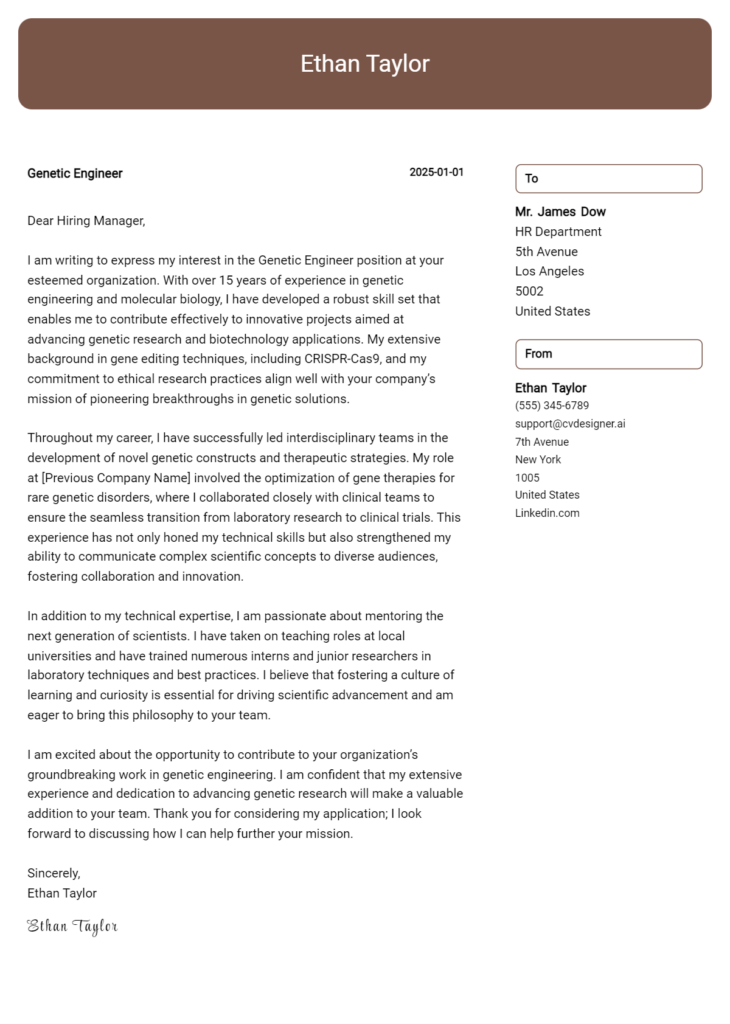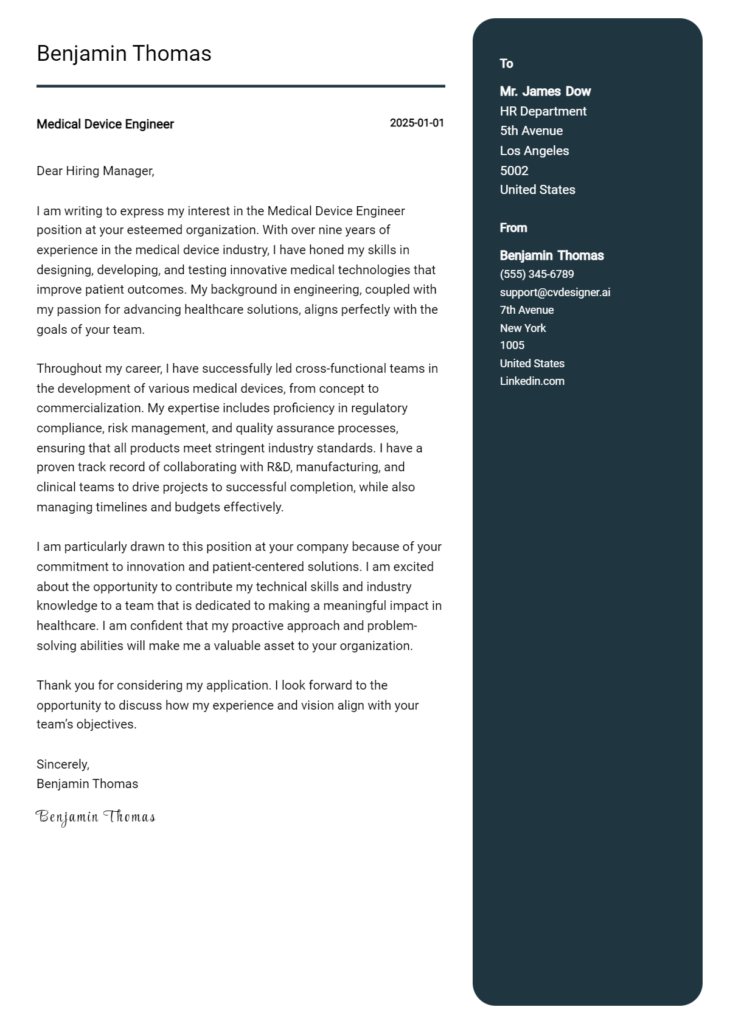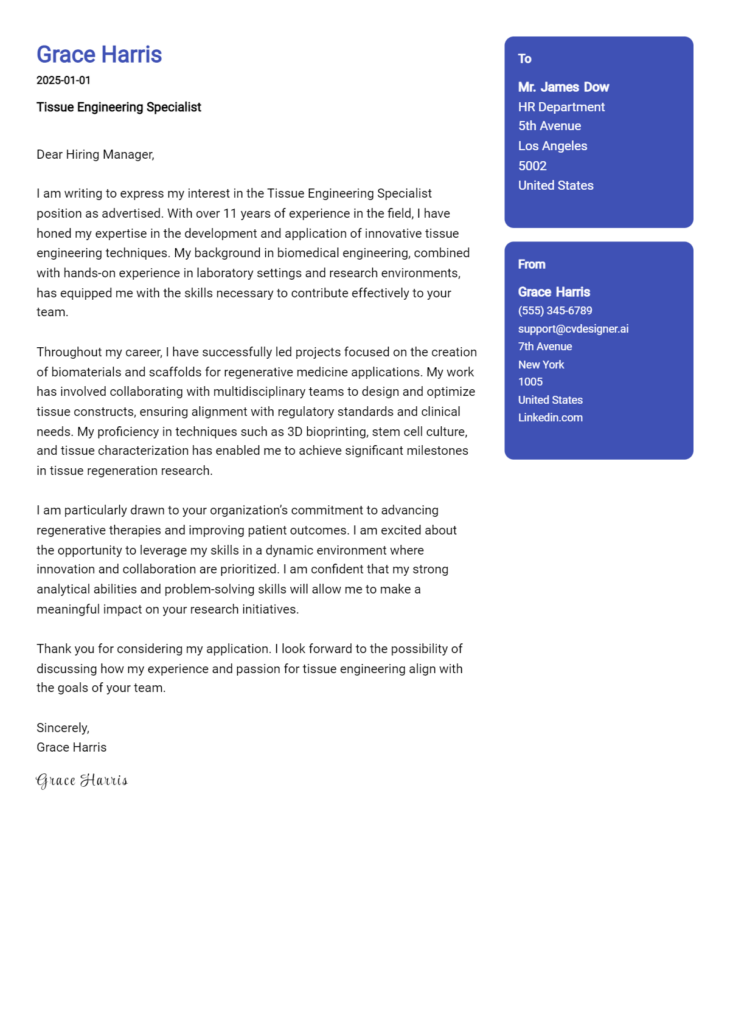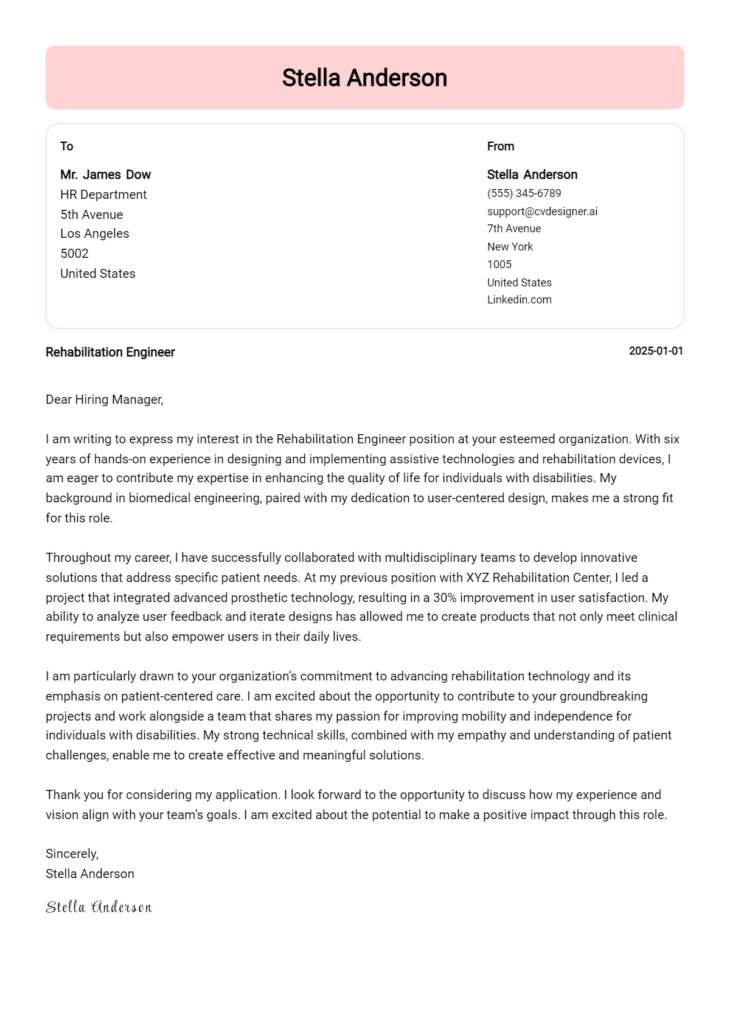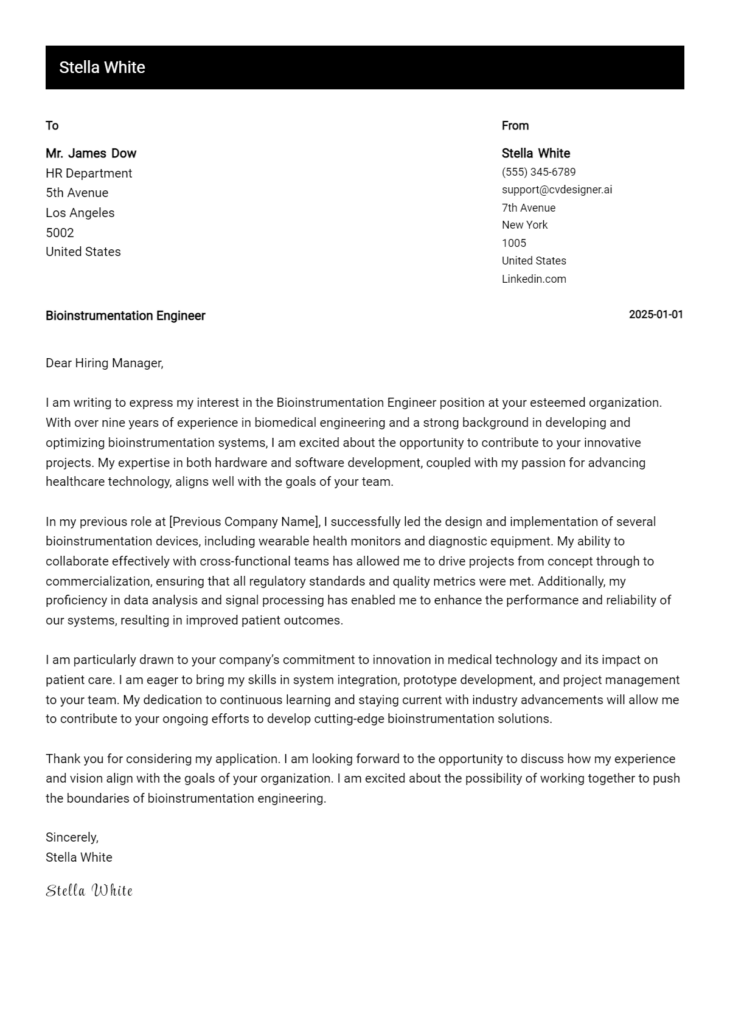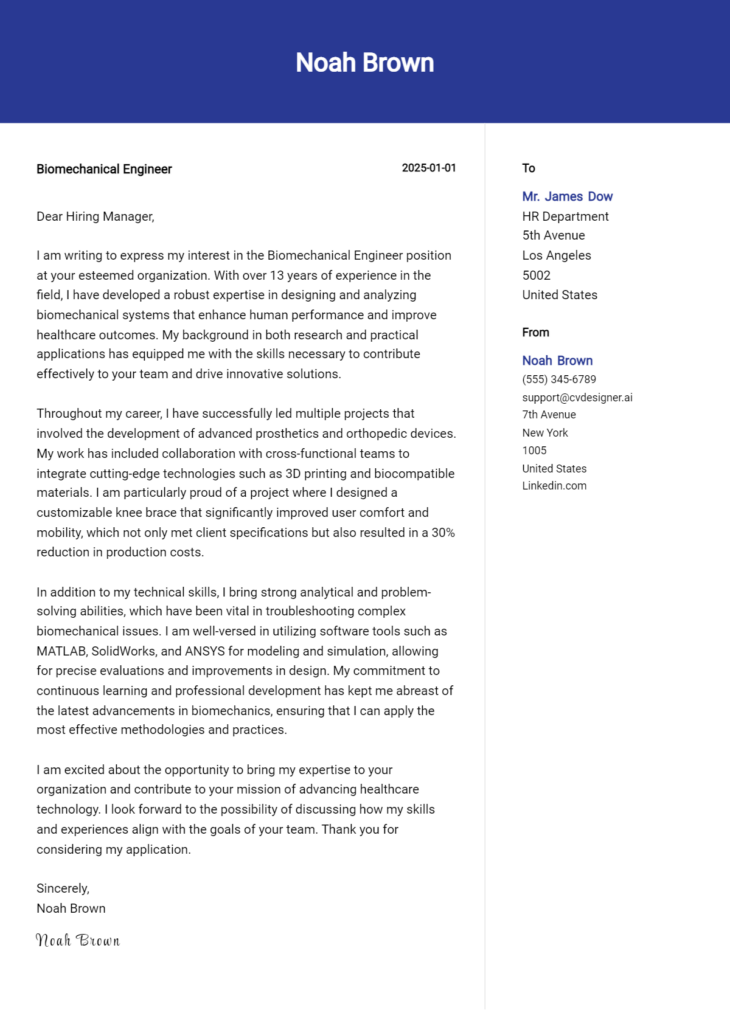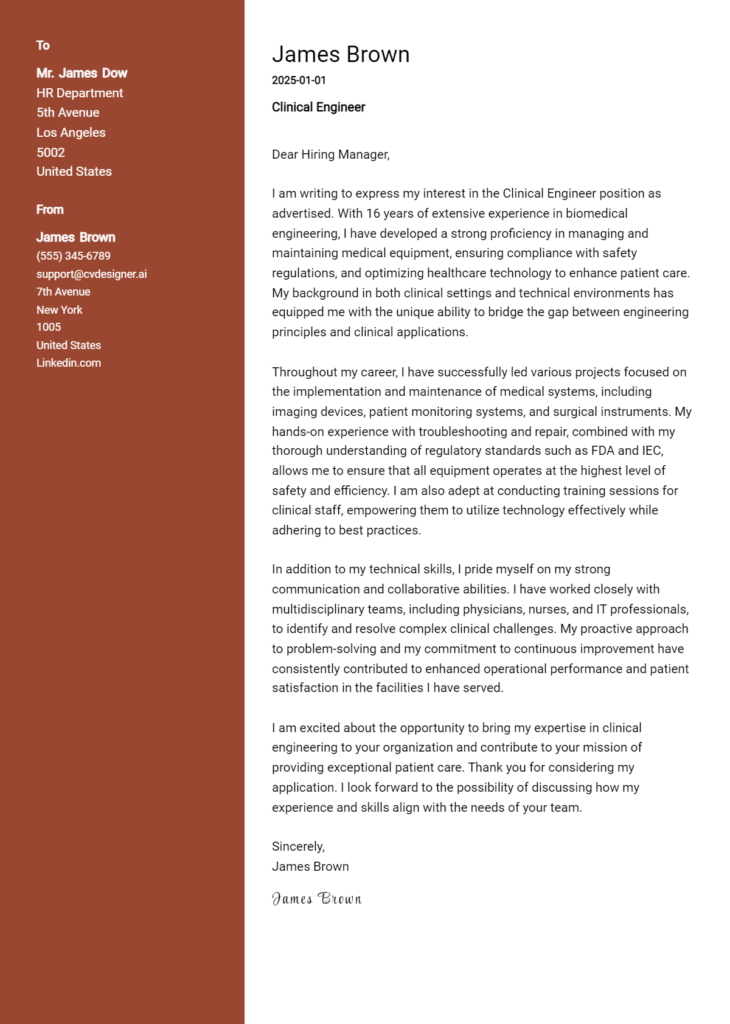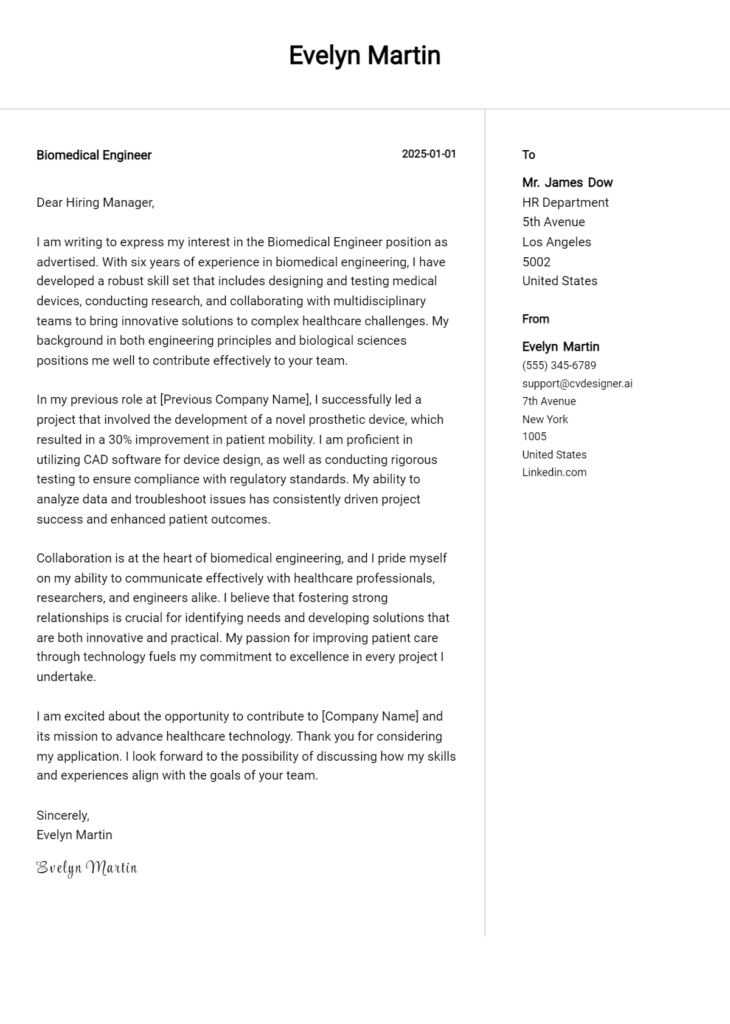Neuroengineering Specialist 2 Cover Letter Examples
Explore additional Neuroengineering Specialist 2 cover letter samples and guides and see what works for your level of experience or role.
How to Format a Neuroengineering Specialist Cover Letter?
Crafting a compelling cover letter for a Neuroengineering Specialist position is vital, as it serves as your first impression on potential employers. The way you format your cover letter not only demonstrates your professionalism but also reflects your understanding of the intricate balance between engineering and neuroscience. A well-structured cover letter can effectively showcase your problem-solving skills, innovative mindset, and attention to detail—critical attributes in the field of neuroengineering.
In this guide, we'll outline how to format your cover letter, providing valuable tips and neuroengineering-specific examples to help you create a standout document.
We'll focus on the essential components of a professional cover letter, including:
- Cover Letter Header
- Cover Letter Greeting
- Cover Letter Introduction
- Cover Letter Body
- Cover Letter Closing
Each section plays a crucial role in emphasizing your qualifications and expertise. Let’s dive into each part and discover how to make your neuroengineering cover letter shine.
Importance of the Cover Letter Header for a Neuroengineering Specialist
The cover letter header is a crucial component of any professional correspondence, particularly for a Neuroengineering Specialist where precision and clarity are paramount. A well-structured header not only conveys professionalism but also ensures that the recipient can easily identify the sender’s information and the context of the communication. The header should include your contact information, the date, and the recipient's details (name, title, and organization). This format not only enhances the readability of your application but also reflects your attention to detail, which is essential in the field of neuroengineering.
Strong Example Header
Jane Doe 123 Neuro Lane Brain City, BC 12345 jane.doe@email.com (123) 456-7890 October 10, 2023 Dr. John Smith Director of Neuroengineering Innovative Neurotech Solutions 456 Brainwave Blvd Tech Town, TC 67890
Weak Example Header
jane doe email: jane.doe@email.com 10/10/2023 to whom it may concern
The Importance of a Strong Cover Letter Greeting
A well-crafted greeting in your cover letter is crucial as it sets the tone for the rest of your application. It immediately conveys your professionalism and shows that you have taken the time to personalize your approach. By addressing the hiring manager directly, you create a connection that can make your letter stand out in a sea of applications. To avoid generic greetings such as "To Whom It May Concern," it's essential to conduct a bit of research to find the recipient's name. This demonstrates your initiative and genuine interest in the position.
Here are some examples of strong and weak greetings for a Neuroengineering Specialist cover letter:
Strong Greeting Example
Dear Dr. Smith,
Weak Greeting Example
To Whom It May Concern,
The Importance of a Strong Cover Letter Introduction for a Neuroengineering Specialist
A well-crafted cover letter introduction is crucial for a Neuroengineering Specialist, as it serves as the first impression that can either captivate or deter a hiring manager. In this highly specialized field, the introduction should succinctly express the candidate's enthusiasm for the role while highlighting their unique qualifications and relevant achievements. A strong opening not only piques the hiring manager's interest but also sets the tone for the rest of the letter, ultimately increasing the chances of securing an interview. Below are examples of both strong and weak cover letter introductions to illustrate the difference.
Strong Example
Dear [Hiring Manager's Name], I am excited to apply for the Neuroengineering Specialist position at [Company Name], where I can leverage my extensive experience in developing cutting-edge neural interfaces and my passion for advancing brain-computer interaction technologies. With a Master's degree in Neuroengineering and over five years of hands-on experience in both academic and clinical settings, I have successfully led projects that resulted in innovative solutions for patients with neurological disorders. I am eager to contribute my expertise to your team and help drive the future of neurotechnology.
Weak Example
Dear [Hiring Manager's Name], I am writing to apply for the Neuroengineering Specialist job. I think it seems like a good opportunity. I have done some work related to neuroengineering, and I believe I could be a good fit for your team.
Purpose of the Cover Letter Body for a Neuroengineering Specialist
The body of a cover letter for a Neuroengineering Specialist serves to effectively showcase the candidate's relevant skills and experiences, illustrating their value to the prospective employer. This section should highlight specific projects or accomplishments that demonstrate the candidate's expertise in neuroengineering, as well as their ability to contribute positively to the company's goals. By detailing unique contributions to past projects, such as the development of advanced neuroprosthetics or participation in interdisciplinary research teams, candidates can create a compelling narrative that sets them apart from other applicants.
Strong Example
In my previous role at NeuroTech Innovations, I led a project focused on the development of a novel brain-computer interface that significantly improved communication for patients with severe motor impairments. This initiative not only enhanced the quality of life for the users but also resulted in a 30% increase in efficiency compared to existing technologies. Additionally, my collaboration with a diverse team of engineers and neuroscientists cultivated a rich, interdisciplinary approach that I believe would align well with your company’s commitment to innovation and user-centered design. I am excited about the opportunity to bring my expertise in neural signal processing and my passion for improving patient outcomes to your team.
Weak Example
I have worked in neuroengineering for a few years and have some experience with brain-computer interfaces. I think I would be a good fit for your company because I know a lot about the field. I have also done some projects, but I am not sure how successful they were. I am eager to learn more and help your organization.
Importance of the Cover Letter Closing for a Neuroengineering Specialist
The closing paragraph of a cover letter is crucial for making a lasting impression on potential employers, especially for a specialized role like a Neuroengineering Specialist. It serves to summarize your qualifications, reiterate your enthusiasm for the position, and encourage the hiring manager to take the next step, such as reviewing your resume or scheduling an interview. A strong closing can reinforce your fit for the role and leave the employer with a positive impression of your candidacy. Conversely, a weak closing may fail to convey your passion or leave the reader uncertain about your interest in moving forward.
Strong Example
Thank you for considering my application for the Neuroengineering Specialist position. With my extensive background in neuroprosthetics and hands-on experience in brain-computer interface development, I am excited about the opportunity to contribute to your innovative team. I look forward to the possibility of discussing how my skills can align with your organization's goals. Please feel free to contact me to schedule a conversation at your convenience. Thank you for your time and consideration.
Weak Example
I hope you look at my resume and think it’s okay. I want the Neuroengineering Specialist job, and I guess I could be a good fit. If you want to talk, you can call me or something. Thanks.
Crafting an effective cover letter is crucial for candidates aiming to secure a position as a Neuroengineering Specialist. This role demands a unique blend of technical skills, problem-solving abilities, and an understanding of the software development life cycle (SDLC). Additionally, showcasing teamwork and a passion for continuous learning can significantly bolster your application. The following tips will guide you in highlighting these important qualities and ensuring your cover letter stands out.
Cover Letter Writing Tips for Neuroengineering Specialist
Highlight Technical Skills: Begin your cover letter by clearly outlining your technical expertise relevant to neuroengineering. Mention specific tools, software, and methodologies you are proficient in, such as MATLAB, Python, or neural signal processing techniques. This not only demonstrates your qualifications but also shows that you are well-versed in the technical demands of the position.
Emphasize Problem-Solving Abilities: Neuroengineering often involves tackling complex challenges. Use your cover letter to provide examples of past experiences where you effectively solved problems. Describe the situation, the actions you took, and the outcomes. This narrative approach can vividly illustrate your analytical thinking and ability to navigate difficult scenarios.
Showcase SDLC Knowledge: Familiarity with the software development life cycle is essential in neuroengineering roles. Include details about your experience in software design, testing, and deployment processes. Discuss how your understanding of SDLC principles has enhanced collaboration with cross-functional teams to deliver projects on time.
Demonstrate Teamwork and Collaboration: Neuroengineering projects often require collaboration with professionals from various disciplines. Highlight experiences where you worked in teams, detailing your role and contributions. This will show potential employers that you can effectively communicate and collaborate with others, which is critical in interdisciplinary environments.
Express a Passion for Continuous Learning: The field of neuroengineering is rapidly evolving, making it vital to stay updated with the latest advancements. In your cover letter, mention any additional courses, certifications, or workshops you have pursued to enhance your knowledge. This demonstrates your commitment to personal and professional growth, which is highly valued in the tech-driven landscape of neuroengineering.
For those looking to further refine their cover letter, consider utilizing cover letter templates or a cover letter builder to ensure your application is polished and professional.
Common Mistakes to Avoid in a Neuroengineering Specialist Cover Letter
Crafting a compelling cover letter is essential for standing out in the competitive field of neuroengineering. Common mistakes can undermine your chances of success and fail to showcase your qualifications effectively. Here are some pitfalls to avoid:
- Generic Content: Using a one-size-fits-all approach can make your application seem insincere. Tailor your letter specifically to the neuroengineering role and the company.
- Neglecting Formatting: Poor formatting can distract from your qualifications. Adhere to proper cover letter format to ensure clarity and professionalism.
- Failure to Highlight Relevant Skills: Focus on skills specific to neuroengineering, such as knowledge of neural interfaces or signal processing. Make sure to connect these skills to the job description.
- Being Too Lengthy: A cover letter should be concise; typically, no more than one page. Aim for clarity and brevity to keep the reader engaged.
- Ignoring the Employer's Needs: Your cover letter should address how you can meet the employer's specific needs, rather than just listing your achievements. Research the company and incorporate their goals into your narrative.
- Typos and Grammatical Errors: Mistakes can create a negative impression. Proofread your letter multiple times and consider having a friend review it.
- Lack of a Strong Closing: A weak conclusion can leave a lasting negative impression. End with a compelling call to action, expressing your eagerness to discuss your application further.
By avoiding these common mistakes and focusing on crafting a well-structured letter, you can significantly enhance your chances of landing an interview. For inspiration, check out cover letter examples to guide your writing.
Cover Letter FAQs for Neuroengineering Specialist
What should I include in my cover letter for a Neuroengineering Specialist position?
In your cover letter, focus on your educational background and relevant experience in both neuroscience and engineering. Highlight any specialized skills, such as programming in MATLAB or Python, knowledge of neuroimaging techniques, or experience with neural interface technology. Be sure to mention specific projects that demonstrate your problem-solving abilities and technical expertise. Additionally, express your passion for the field and how it aligns with the organization's goals. Tailor your letter to reflect the job description, emphasizing why you are a perfect fit for the position.
How can I demonstrate my passion for neuroengineering in my cover letter?
To showcase your passion for neuroengineering, share personal anecdotes or experiences that ignited your interest in the field. Discuss relevant projects, research, or internships that deepened your understanding of neuroengineering concepts. Mention any professional organizations, conferences, or workshops you've attended that illustrate your commitment to continuous learning. Additionally, express your enthusiasm for the specific work being done at the organization you are applying to, indicating how your interests align with their mission and projects.
How long should my cover letter be for a Neuroengineering Specialist position?
Your cover letter should ideally be one page long, consisting of three to four paragraphs. This length allows you to provide sufficient detail about your qualifications without overwhelming the reader. Start with a compelling introduction that grabs attention, followed by a body section that outlines your relevant skills and experiences. Conclude with a strong closing statement that reinforces your enthusiasm for the position and invites the hiring manager to reach out for further discussion. Remember to be concise and focused, ensuring every sentence adds value.
Should I address my cover letter to a specific person or use a generic greeting?
Whenever possible, address your cover letter to a specific person, such as the hiring manager or team lead. This shows that you have done your research and adds a personal touch to your application. If you cannot find a name, a more general greeting, such as "Dear Hiring Manager," is acceptable. However, avoid overly generic phrases like "To Whom It May Concern." Personalizing your cover letter not only demonstrates your attention to detail but also helps create a connection with the reader, making your application more memorable.
Build your Cover Letter in minutes
Use an AI-powered cover letter builder and have your letter done in 5 minutes. Just select your template and our software will guide you through the process.

